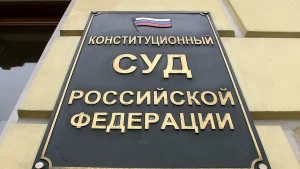The court indicated, that the seizure imposed in order to secure a possible confiscation is canceled, if in the course of the preliminary investigation or judicial consideration of the criminal case it is established that the property belongs to persons, to which confiscation does not apply.
Конституционный Суд опубликовал Definition № 3-О от 17 January 2023 Mr., who were denied acceptance of the lessor’s complaint about the inability to challenge the arrest of cars from the lessee in the framework of the criminal case initiated against its founder and employees.
Arrest of property and attempts to return it
RESO-Leasing Company in 2015–2016. purchased cars under financial lease agreements (leasing) transferred them to the temporary possession and use of Arenda-Torg LLC.
2 August 2016 y. in relation to persons, associated with the company "Arenda-Torg", including its founder and director, a criminal case was opened on. "a", "b" h. 2 Art. 172 "Illegal Banking", h. 1 and 2 Art. 210 "Organization of the criminal community (criminal organization) or participation in it (her)» READ. In this regard, the court 15 and 25 August, as well as 28 September 2016 y. seized leasing vehicles.
RESO-Leasing unsuccessfully filed cassation complaints against the decisions, which extended the period of arrest for cars. Refusing to transfer complaints for consideration in court, the judge of the Supreme Court of the Republic of Tatarstan and the judge of the Supreme Court of the Russian Federation disagreed with the applicant, who claimed that the seizure of property was unlawful due to its ownership by the lessor. The courts proceeded from the validity of the argument of the investigating authority that, that cars, owned by the company "Arenda-Torg", purchased with cash, received as a result of illegal banking operations, but documents, as the courts have noted, on the acquisition of property at its own expense, RESO-Leasing did not provide.
10 February 2017 y. RESO-Leasing unilaterally sent the lessee a notice of termination of the contracts with a demand to repay the debt and return the leased items.
29 August 2019 y. The Arbitration Court of the Republic of Tatarstan dismissed the claims of RESO-Leasing, presented to the Russian Federation represented by the Ministry of Internal Affairs, on the recovery of damages, caused by prolonged seizure of property in a criminal case. The decision is based on, that the actions of the defendant's officials were not recognized as illegal (there is no unlawfulness of causing harm) and that there is no causal link between their behavior during the preliminary investigation and the losses incurred by the plaintiff in the form of a decrease in the market value of vehicles. The appeal upheld the decision, cassation and the judge of the Supreme Court supported her.
13 March 2020 y. Naberezhnye Chelny City Court of the Republic of Tatarstan refused to accept for consideration filed in accordance with Art.. 125 Code of Criminal Procedure of the complaint of "RESO-Leasing" on the recognition of illegal and unreasonable actions of the investigator, initiated the seizure of the leased property. The court indicated, that there is a different procedure for judicial protection for this. The higher courts agreed with this decision..
Contacting the CC
In a complaint to the Constitutional Court, RESO-Leasing stated, what about the transfer in december 2018 y. of the criminal case to the court, she repeatedly and unsuccessfully appealed to the investigator with petitions to cancel the seizure of property. It was also noted, that after the defendants were sentenced 14 July 2020 y. court order dated 16 November 2020 y. it was refused to accept for production a petition for the abolition of the said measure of procedural coercion, because the verdict has not entered into force. As a result, the arrest was canceled only 17 September 2021 y. - five years after its inception.
RESO-Leasing LLC asked to recognize h. 1 and 3 Art. 115 and h. 1 Art. 125 CPC to the extent, in which they deprive the lessor, the owner of the vehicle, real and timely judicial protection of the constitutional right of ownership in the event of seizure of this vehicle during criminal proceedings, filed against the lessee (its members), in temporary possession and use of which the vehicle was located on the basis of a leasing agreement.
The Constitutional Court clarified the procedure for imposing and removing arrest on leased property
Refusing to accept a complaint, the SC noted, that the arrest, imposed on property, or individual restrictions, to which the seized property is subjected, by virtue of ch. 9 Art. 115 CPC are canceled on the basis of a decision, definition of a person or body, in whose proceedings is the criminal case, when in the application of the said measure of procedural coercion or individual restrictions, to which the seized property is subjected, there is no need, as well as in the event of the expiration of the period of arrest established by the court or refusal to extend it. At the same time, in the event of a dispute, the possibility of checking the actions is not excluded. (inactivity) persons or organs, authorized to cancel the seizure of property, higher authority or court.
Within the meaning of the current regulation, noted Court, seizure of property as a procedural preventive measure is used to secure a future court decision on property recovery or to preserve material evidence, when there is a possibility of non-execution of such a decision or loss of traces of the crime. As evidence is collected in the course of criminal proceedings, the grounds for a future penalty or their absence are specified., including from the point of view of the circle of people, who may be sanctioned under substantive law. The extension of the term of arrest should be carried out taking into account the results of the preliminary investigation and judicial proceedings, allowing, among other things, to assess the actual and legal ownership of the property subjected to arrest. The establishment of the impossibility of imposing a property penalty also excludes the further preservation of its procedural support..
"Therefore imposed, in particular, in order to ensure possible confiscation, the arrest is canceled, if in the course of the preliminary investigation or judicial consideration of the criminal case it is established that the property belongs to persons, to which confiscation does not apply. To do otherwise would violate fundamental legal principles, from which follows the need for reasonable proportion between the means used and the end pursued, would entail an excessive and unjustified restriction of rights", - specified in the definition.
The Constitutional Court referred to a number of its legal positions and noted, that the seizure of property cannot be arbitrary and must be conditioned by the alleged involvement of a particular person in criminal activity or the alleged criminal nature of the origin (use) specific property or must be based on the law, establishing the material responsibility of a person for the actions of a suspect or accused. Seizure of property, held by persons, who are not suspects, defendants or persons, legally liable for their actions, allowed only for public law purposes to ensure the alleged confiscation of property or the preservation of property, relating to material evidence in a criminal case, and only on condition, that with regard to this property there are - taking into account the urgent situation possible during the initial application of this coercive measure, expressed, among other things, in the incomplete establishment of circumstances, subject to Art.. 73 Criminal Procedure Code of Evidence in a Criminal Case, – sufficient, substantiated grounds for believing, that it was obtained as a result of the criminal actions of the suspect, the defendant was or was used or intended to be used as an instrument of crime or to finance criminal activities.
However, noticed the cop, it is not excluded that the legal regime of seizure of property remains in place to ensure - with effective judicial control - the private law purposes of compensating the injured person, caused by the crime, if a civil claim is filed in the case and the owner of the seized property is subject to prosecution as a civil defendant. In this case, the extension of the arrest must be carried out on the basis of part. 1 Art. 115 Code of Criminal Procedure, taking into account the observance of the rules on the limitation period and the involvement of the owner of the arrested property as a civil defendant. The extension of the period of arrest is also subject to the results of the preliminary investigation., allowing, in particular, estimate, whether the seized property was actually acquired from the person, who had no right to alienate him (what the acquirer did not know and could not know), knew or should have known the owner of the seized property, that it was obtained by criminal means, whether he was involved in the commission of a crime and whether he is subject to criminal liability, property acquired for a fee or free of charge (decision of the Constitutional Court of 31 January 2011 y. No. 1-P/2011; from 21 October 2014 y. No. 25-P/2014 and by 17 April 2019 y. No. 18-P/2019).
The court indicated, that the owner or other owner of the property, who has been arrested, is involved in this connection in criminal procedural relations, becomes a participant in the process and is endowed with a number of rights. By virtue of ch. 1 Art. 11 CPC court, prosecutor, investigator, the interrogator is obliged to explain to the participants in criminal proceedings their rights, duties and responsibilities and ensure that these rights can be exercised. The owner or other owner of the seized property may protect their rights and legitimate interests, including within the framework of the procedure for extending the term of this coercive measure.
So, according to Art.. 115.1 of the Code of Criminal Procedure, when considering by a judge a petition for an extension of the term of arrest, a person has the right to participate in a court session, among others, whose property has been seized; having considered the application, the judge issues an order to extend the period of arrest, saving or changing restrictions, related to ownership, use and disposal of seized property, or full or partial refusal to satisfy the application, including the cancellation of the arrest, imposed on property, or changing the specified restrictions; in deciding whether to extend the term of arrest, on maintaining restrictions, to which the seized property is subjected, person or body, in whose proceedings is the criminal case, as well as the court are obliged to ensure compliance with a reasonable period of application of this measure of procedural coercion in relation to the property of persons, who are not suspects, defendants or persons, legally liable for their actions; when determining a reasonable period of arrest, the circumstances, specified in h. 3.2 Art. 6.1 Code; the issue of awarding compensation for violation of a reasonable time limit for the application of this coercive measure in relation to the property of persons, who are not suspects, defendants or persons, legally liable for their actions, decided by the court, established by federal law, and questions, related to compensation for property damage, caused by breach of a reasonable time, resolved in civil proceedings (h. 6); the said decision of the judge can be appealed to a higher court in the appellate and cassation procedure, established chapter. 45.1 and 47.1 Code of Criminal Procedure.
In its turn, indicated the COP, according to h. 7.2 Art. 3 of the Law on Compensation for Violation of the Right to Trial within a Reasonable Time or the Right to Enforcement of a Judicial Act within a Reasonable Time Application for Compensation for Violation of the Right to Criminal Proceedings within a Reasonable Time in Part of the Duration of the Procedural Compulsory Measure in the Form of Seizure of a Person’s Property, unsuspected, accused or person, legally liable for their actions, may be filed with the court by the said person within six months from the date of, in particular, the entry into force of the judgment, as well as before the entry into force of the verdict, if the duration of the arrest, imposed on property in a criminal case, over four years.
The Constitutional Court considered, that disputed by the applicant h. 1 and 3 Art. 115 Code of Criminal Procedure, taken in the system of current regulation, cannot be regarded as violating his constitutional rights. At the same time, verification of the legality and validity of the application of these provisions, taking into account the actual circumstances of a particular case, What is the essence of the applicant's arguments?, does not fall within the competence of the CC. Besides, a complaint to the Constitutional Court must be filed no later than one year after the consideration of the case in court; a copy of the official document must be attached to the complaint, confirming the application of the contested law in the applicant's case. In the meantime, RESO-Leasing presented evidence confirming the application of the contested provisions of Art.. 115 Code of Criminal Procedure Judgments, issued more than a year before his appeal to the Constitutional Court.
As for h. 1 Art. 125 Code of Criminal Procedure, noticed the cop, consideration, according to the rules provided for in it, of complaints against the decisions of the interrogator, investigator to file a motion before the court to seize property and to extend the period of such seizure, as well as complaints about actions, related to these rulings., would replace the procedure for judicial protection enshrined in this Code, according to which the corresponding petition is considered by the court in the manner, established by his art. 165, and court decisions adopted as a result of such consideration, in its turn, subject to appeal and cassation (h. 1 and 3 Art. 115 and st. 127 Code of Criminal Procedure). As the Constitutional Court has repeatedly pointed out, Art. 46 Constitution, guaranteeing everyone judicial protection of his rights and freedoms, the right to appeal to the court decisions and actions (inactivity) public authorities and officials, does not provide a citizen with the opportunity to choose at his own discretion the procedures for judicial protection, the features of which are determined by federal laws.
The problem is widespread
Старший партнер АБ ZKS Андрей Гривцов обратил внимание, that in fact the Constitutional Court established the existence of a violation - a long-term seizure of property of a third party, which was not subject to confiscation, but did not take a decision to review the earlier decisions made by the courts on this matter. He noted with regret, that this is generally in line with the current practice of the Constitutional Court, but in many ways makes going there for protection useless.
"As for the situation itself, then it is obvious and, is unfortunately, quite common: courts very often, at the request of investigators, seize the property of third parties, despite the fact that, by virtue of the law, foreclosure on this property is possible only in exceptional and strictly stipulated by law cases. This is primarily related to, that in many respects the activity of the investigator is ruled by statistics and it is evaluated by the amount of property, who has been arrested. This is called taking action to compensate for the damage caused.. In this case, the law is unambiguous. In this regard, first of all, it is necessary to change the practice. This is only possible if, if higher courts react sharply to such violations and cancel illegal decisions to seize property”, Andrey Grivtsov pointed out.
A lawyer, Member of the General Council of Business Russia, Head of the Expert Center for Criminal Law Policy and Enforcement of Judicial Acts, project ambassador “Business Duty Officer” Ekaterina Avdeeva noted, that the problem of a long stay of a third party's property under arrest is relevant and really leads to a violation of the legal rights of a leasing company. However, she added, the issues raised in the complaint reveal the problems of law enforcement practice, and not the lack of compliance of the norms of the Code of Criminal Procedure with the Constitution.
However, it is necessary to understand, that leasing is not a simple transfer of property for rent, a special financial instrument, which assumes after making all payments, usually, payment of a redemption payment in a symbolic amount in relation to the real value of the property. Hence, in accordance with Art.. 624 Civil Code of the Russian Federation and Art. 19 of the Law on Leasing, such an agreement can be considered as a mixed (p. 3 Art. 421 Civil Code of the Russian Federation), containing elements of lease and sale agreements. With a buyout lease, the balance of counter obligations is determined, so you can't talk about, that the leasing company can fully apply for the subject of leasing, and the company, who is a defendant in a criminal case, has nothing to do with this property., as if it had been rented out, as it was necessary to evaluate, how many payments have been made, What was the value of the property at the time of the seizure?, she pointed out.
The lawyer noticed: from the text of the definition of the COP follows, that the RESO-Leasing company itself did not provide evidence of the acquisition of property at its own expense, though obviously, that they were spent, to zero, but, , most likely, balance has not been determined. "The COP emphasized, which denies the applicant precisely because of the impossibility to evaluate the contested hours. 1 and 3 Art. 115 CPC as violating his constitutional rights in the context of the arguments, specifying, that the applicant's arguments are aimed at testing the legality and validity of the application of the provisions, taking into account the actual circumstances of the case, but this question, obviously, refers to law enforcement practice and should be allowed by the RF Armed Forces”, she considered.
Ekaterina Avdeeva considers it important to see the position of the Armed Forces, Maybe, дополнив Decree Пленума ВС от 1 June 2017 y. № 19 “On the practice of consideration by courts of petitions for the production of investigative actions, associated with the restriction of the constitutional rights of citizens (article 165 Code of Criminal Procedure)», which addresses only some aspects of the application of Art.. 115 Code of Criminal Procedure. Question, which was put before the Constitutional Court of the Russian Federation by a leasing company, is of great importance for law enforcement practice, lawyer pointed out.







